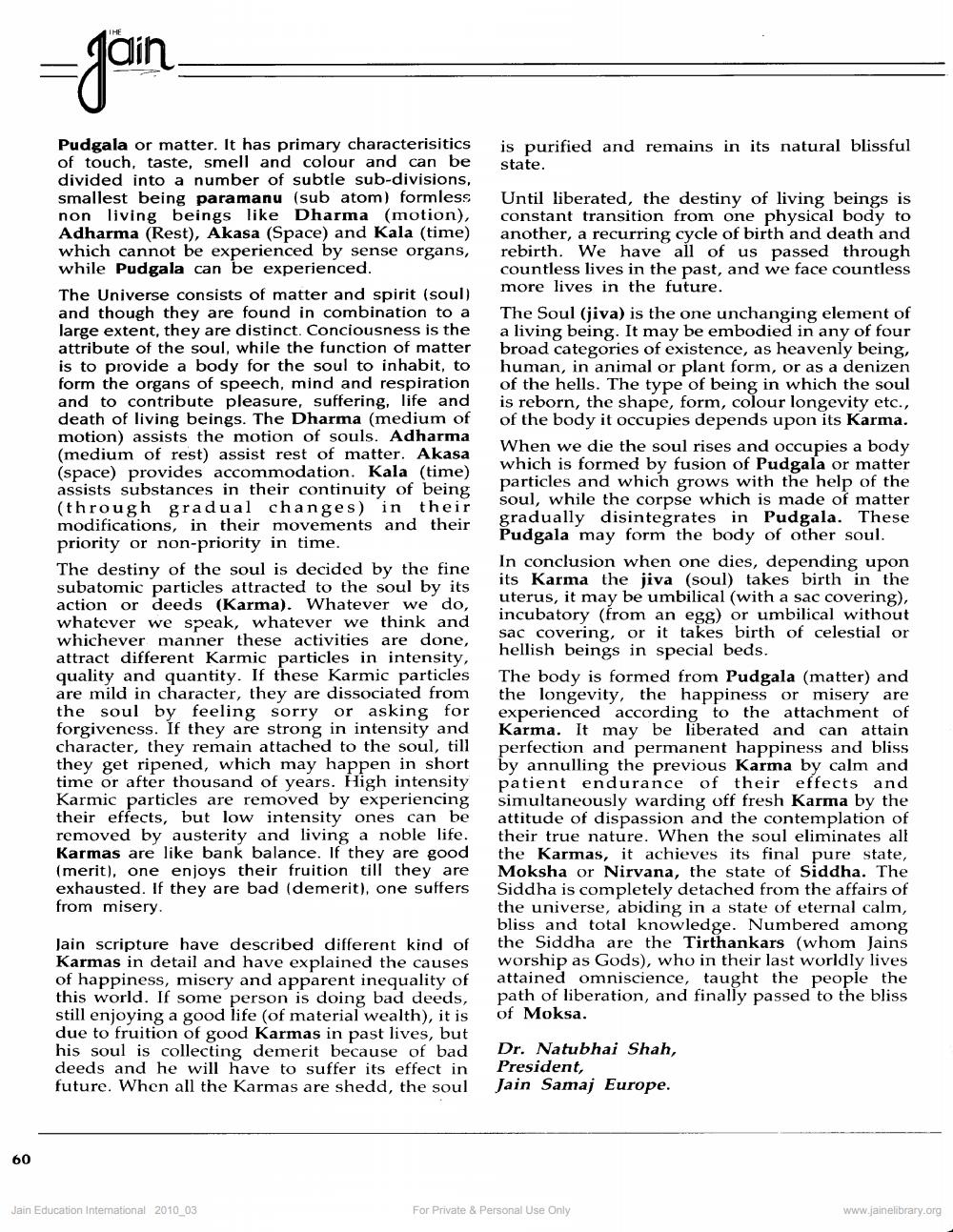________________
60
THE
-Jain
Pudgala or matter. It has primary characterisitics of touch, taste, smell and colour and can be divided into a number of subtle sub-divisions, smallest being paramanu (sub atom) formless non living beings like Dharma (motion), Adharma (Rest), Akasa (Space) and Kala (time) which cannot be experienced by sense organs, while Pudgala can be experienced.
The Universe consists of matter and spirit (soul) and though they are found in combination to a large extent, they are distinct. Conciousness is the attribute of the soul, while the function of matter is to provide a body for the soul to inhabit, to form the organs of speech, mind and respiration and to contribute pleasure, suffering, life and death of living beings. The Dharma (medium of motion) assists the motion of souls. Adharma (medium of rest) assist rest of matter. Akasa (space) provides accommodation. Kala (time) assists substances in their continuity of being (through gradual changes) in their modifications, in their movements and their priority or non-priority in time.
The destiny of the soul is decided by the fine subatomic particles attracted to the soul by its action or deeds (Karma). Whatever we do, whatever we speak, whatever we think and whichever manner these activities are done, attract different Karmic particles in intensity, quality and quantity. If these Karmic particles are mild in character, they are dissociated from the soul by feeling sorry or asking for forgiveness. If they are strong in intensity and character, they remain attached to the soul, till they get ripened, which may happen in short time or after thousand of years. High intensity Karmic particles are removed by experiencing their effects, but low intensity ones can be removed by austerity and living a noble life. Karmas are like bank balance. If they are good (merit), one enjoys their fruition till they are exhausted. If they are bad (demerit), one suffers from misery.
Jain scripture have described different kind of Karmas in detail and have explained the causes of happiness, misery and apparent inequality of this world. If some person is doing bad deeds, still enjoying a good life (of material wealth), it is due to fruition of good Karmas in past lives, but his soul is collecting demerit because of bad deeds and he will have to suffer its effect in future. When all the Karmas are shedd, the soul
Jain Education International 2010_03
is purified and remains in its natural blissful state.
Until liberated, the destiny of living beings is constant transition from one physical body to another, a recurring cycle of birth and death and rebirth. We have all of us passed through countless lives in the past, and we face countless more lives in the future.
The Soul (jiva) is the one unchanging element of a living being. It may be embodied in any of four broad categories of existence, as heavenly being, human, in animal or plant form, or as a denizen of the hells. The type of being in which the soul is reborn, the shape, form, colour longevity etc., of the body it occupies depends upon its Karma. When we die the soul rises and occupies a body which is formed by fusion of Pudgala or matter particles and which grows with the help of the soul, while the corpse which is made of matter gradually disintegrates in Pudgala. These Pudgala may form the body of other soul.
In conclusion when one dies, depending upon its Karma the jiva (soul) takes birth in the uterus, it may be umbilical (with a sac covering), incubatory (from an egg) or umbilical without sac covering, or it takes birth of celestial or hellish beings in special beds.
The body is formed from Pudgala (matter) and the longevity, the happiness or misery are experienced according to the attachment of Karma. It may be liberated and can attain perfection and permanent happiness and bliss by annulling the previous Karma by calm and patient endurance of their effects and simultaneously warding off fresh Karma by the attitude of dispassion and the contemplation of their true nature. When the soul eliminates all the Karmas, it achieves its final pure state, Moksha or Nirvana, the state of Siddha. The Siddha is completely detached from the affairs of the universe, abiding in a state of eternal calm, bliss and total knowledge. Numbered among the Siddha are the Tirthankars (whom Jains worship as Gods), who in their last worldly lives attained omniscience, taught the people the path of liberation, and finally passed to the bliss
of Moksa.
Dr. Natubhai Shah, President, Jain Samaj Europe.
For Private & Personal Use Only
www.jainelibrary.org




